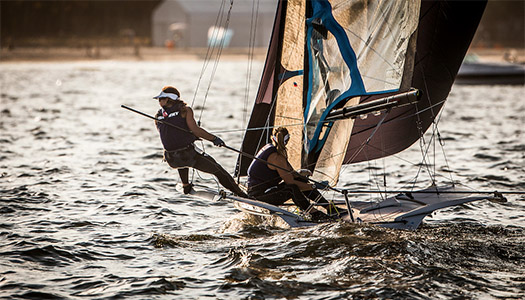#aquecerio – Irish Olympic sailors have dropped out of the top ten in each of their competing disciplines at Aquece Rio. The Olympic test event approached its half way stage in Rio yesterday leaving Irish sailors with a lot of work to do if they are to be in the hunt for medals at the Olympic dress rehearsal this weekend.
49er skiff pair Ryan Seaton and Matt McGovern dropped nine places overall from sixth to 15th place yesterday when they scored 20 and 15 yesterday.
The 49erfx girls Andrea Brewster and Saskia Tidey from Dun Laoghaire are 12th overall after a single race day, commenting on Facebook after sailing: 'Today we headed out of Guanabara Bay to the Atlantic Ocean for a spot of offshore racing... Unfortunately there was absolutely no wind and we spent a good few hours drifting around in the swell trying not to get sea sick! We were then sent inside the bay where there was a glamour breeze, so as soon as a course area became free we were back on for racing. We managed to get one race in before the sun started to set over Rio. We scored a 13th which leaves us in 13th place overall'. [12th according to official scoreboard - Ed]
It was certainly a day of contrasts with Rio's inside course areas playing host to all of the day's competition.
Conditions have not suited the Irish Laser sailors on the Providence Resources sponsored team. In a tough few days for Radial sailor Annalise Murphy, the National Yacht Club helmswoman finished a disappointing 27th to be 27th overall from 28. Belfast's James Espey is 28th from 38.
A steady 10-12 knot southerly breeze inside Guanabara Bay under a beating Brazilian sun enabled some interesting racing for the competitors. Meanwhile, outside of Guanabara Bay, it was a different story as the wind failed to materialise for the sailors to compete.
With the fleets sailing inside completing their scheduled races, the decision to move those from outside the Bay to inside was made, enabling a single early evening race for each fleet.
In total, the Pão de Açúcar, Escola Naval and Ponte courses played host to eight fleets who completed 15 races between them.
Results are here
49er and 49erFX
The 49er sailors enjoyed four good races on the Pão de Açúcar racing area and Peter Burling and Blair Tuke (NZL) revelled in the conditions. Burling and Tuke took three race wins on the day and as a result have lifted themselves up to top spot. Their other result, which was an 11th, is their discarded score.
Several teams enjoyed good results on the day. Erik Heil and Thomas Ploessel (GER) sailed their way to a bullet and two thirds after a disappointing opening race where they came through in 18th. The Germans sit fifth overall.
Kings of consistency, Manu Dyen and Stephane Christidis (FRA) posted four results in the top ten and are sixth. Out of the 20-boat fleet they are the only crew who count a full scorecard of single figure scores.
The 49erFX fleet were scheduled to sail on the Niteroi course but light winds meant they were unable to sail on that course. With six racing areas being tested throughout the week the Race Management team have great flexibility with racing areas and the decision to move to the Pão de Açúcar course was made.
In a light early evening breeze the Pan-American Games gold medallists Victoria Travascio and Maria Sol Branz (ARG) took the single race victory over Martine Grael and Kahena Kunze (BRA). The Argentineans, light wind specialists, have enjoyed the breeze they've faced so far and occupy second place.
Overnight leaders Giulia Conti and Francesca Clapcich (ITA) discard their 11th place and hold on to top spot.
Laser and Laser Radial
Heading into the day the Laser and Laser Radial sailors were prepared for a big challenge on the Pai course, the furthest racing area away from Marina da Gloria. Out in the open sea, big winds and waves were predicted but both failed to materialise.
In the end, the flatter waters of Escola Naval were used for a single race apiece.
Tuula Tenkanen (FIN) took the single Laser Radial race win and is third overall. Gintare Scheidt (LTU) continues to lead the pack.
In the Laser, Tom Burton (AUS) crossed the finish line 19 seconds ahead of Nick Thompson (GBR) for his first win of the week and as a result is seventh overall.
Tonci Stipanovic (CRO) holds onto his lead even though he finished in 16th place.
The Laser, Laser Radial, Finn and 49erFX will catch up on their schedule on 18 August whilst the 49er and Nacra 17 fleets enjoy a day of rest. The Men's and Women's RS:X will be back in the mix on Tuesday as they get down to the business end of the competition.
Racing commences at 13:00 local time.






























































